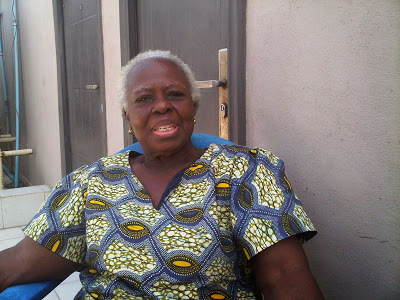Share your views and experiences on all issues.
Today, over 40 years after her plan, Odiakosa still finds joy and fulfillment in a tasking humanitarian service she hopes to render for a life time.
Born and raised in the city of Lagos about 80 years ago, she hails from Epe-Tedo in Lagos State and got married to a Delta State indigene.
School life saw her through the CMS Girls School Lagos and St. Ann’s School Ibadan, where she completed her secondary school education in 1951.
Spending just six months at the College of Arts and Education, Ibadan, which later became the University of Ife, she moved on to England. There, she did a one-year advanced level education at the Sir John Cass College.
She continued her education at the University of Birmingham where she studied medicine, specialising in pediatrics and completed a one-year internship programme before returning to Nigeria.
Dr. Odiakosa worked at the General Hospital, Lagos; the Massey Street Children Hospital; the Institute of Child Health, which was part of the Lagos University Teaching Hospital(LUTH) and the Somolu Health Centre.
Although she was specialised in pediatrics, she became involved in primary health, and at a point, she had the responsibility of establishing curricula for children with special needs in the training of
primary health workers.
Remarkably, Dr. Odiakosa has offered her medical expertise to the health needs of children with special needs.
In that regard, she has in the over forty years and still counting, dedicated quality time to caring for children at the Atunda-Olu School for the mentally and physically challenged at no fee.
She had at various times too, extended her medical care to children in other special- needs schools and the Cheshire Home for the disabled.
At some point also, she ran a free clinic on Randle Avenue, Surulere. She had done that to help mothers who she said bore the bulk of the challenge when a family had a child with special needs.
She remained true to a humanitarian service she believed in, despite some challenges that faced her in the course of the years.
reduced to only four children.
“ They said to me that I would be called whenever they needed me, but I was determined and kept to my regular visit days.”
also had to deal with those who felt she should have done some kind of magical acts to ‘change the head of a child with cerebral palsy.’
In all of it, she gave such parents hope by showing love to the children and teaching the parents how best to care for their children.
She did not get worried when someone called her “the doctor who wants her reward in Heaven.” However, parents who appreciated her kind support offered her all manner of gifts, but she politely
She said, “The school gave me beautiful flowers which I loved so much. But, my greatest joy is seeing the children smile and hug, appreciating the love of God in their lives in spite of their challenges.”
Presently, she is one of the trustees of the Action Health Incorporated, a non-profit, non-governmental organisation that is dedicated to the promotion of adolescent health and development, serving as advocates and a catalyst for change.
Described as a woman with a beautiful heart, she shared the story of how she was inspired to study medicine. “My interest to study medicine arose from my experience as a patient at the General Hospital, Lagos.”
According to Odiakosa, while she was a student at the United Missionary College in Ibadan, she took ill, coughing and vomiting. When her mother learned of her ill- health she made her way to Ibadan from Lagos.
“My mother came to Ibadan in a Daily Times Newspaper Van,” she recalls, “I was astound because it was about 4.30 am.”
While on admission at the hospital, she was moved by the regular cries of mothers whose children died of various illnesses.
Ironically, she refused an initial offer to work at the pediatrics department, until a certain Prof Collins convinced her.
could also make me become good at it and that was it.”
That experience carved a path for her to follow in the selfless service to children and young people.
She encourages parents to help their children grow up to be independent by ensuring that they did some chores around the home by themselves.
“For the special-needs child, just as with the child who is not challenged, parents must allow them to do certain things for themselves because the parents will not always be there for them.”
Dr. Odiakosa counts her wealth in the lives of families she has been able to impact positively by caring for their children with special needs.
Although her children are proud of her as a medical doctor, they studied in other disciplines.
Early in life she taught them to be independent because her work demanded so much time.
“I was able to do that because my mother also raised me and my siblings to be independent,” she said.
Dr. Odiakosa believes that child care-giving is the best gift a person can offer.


































































